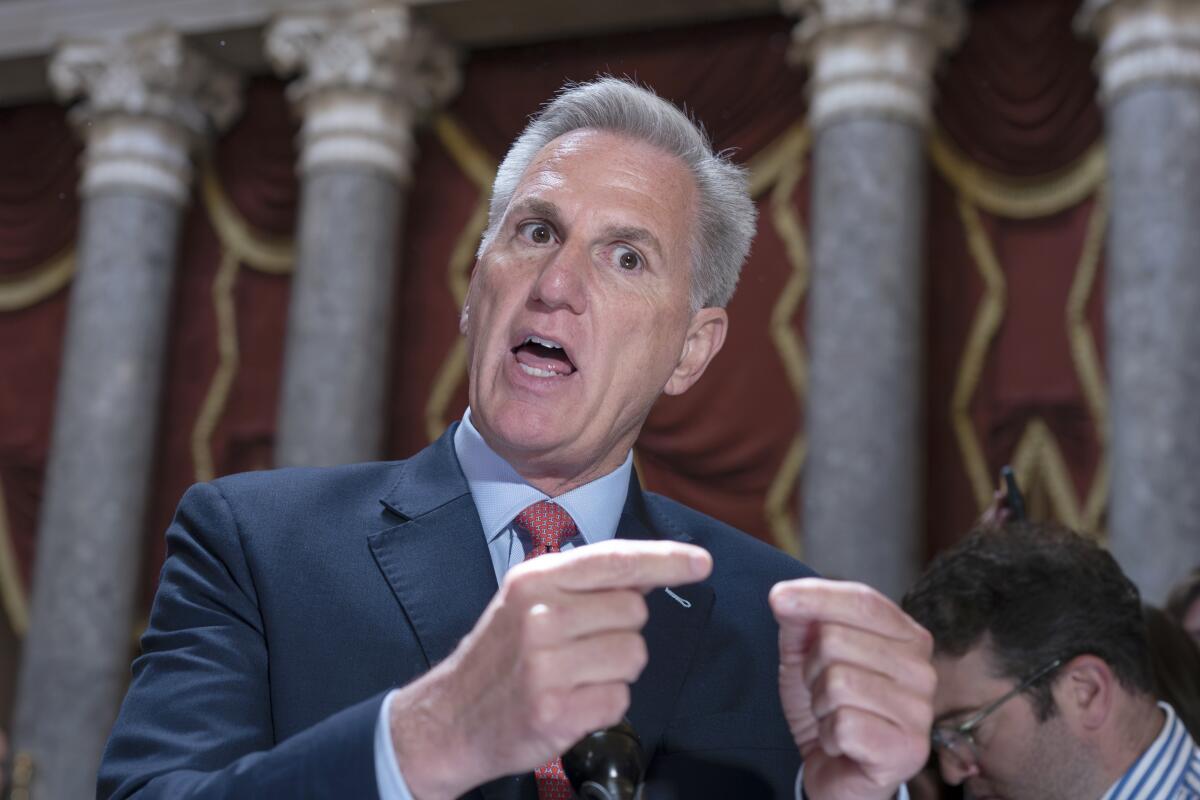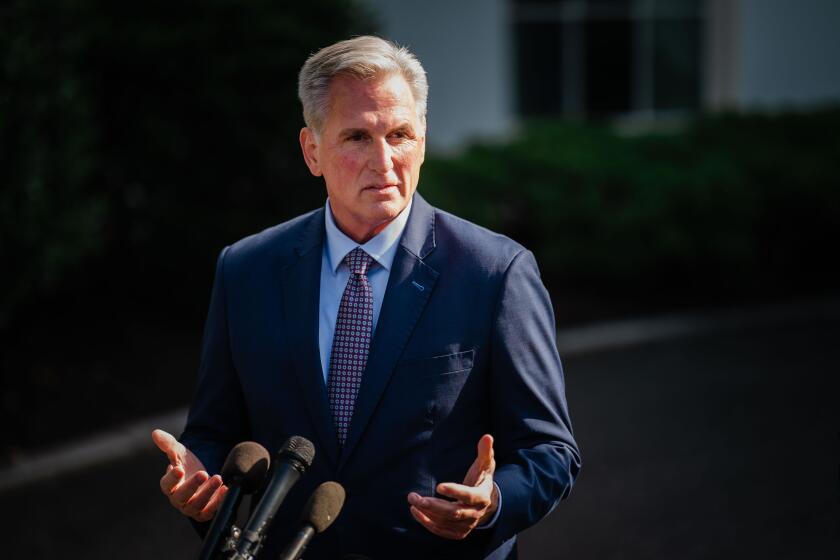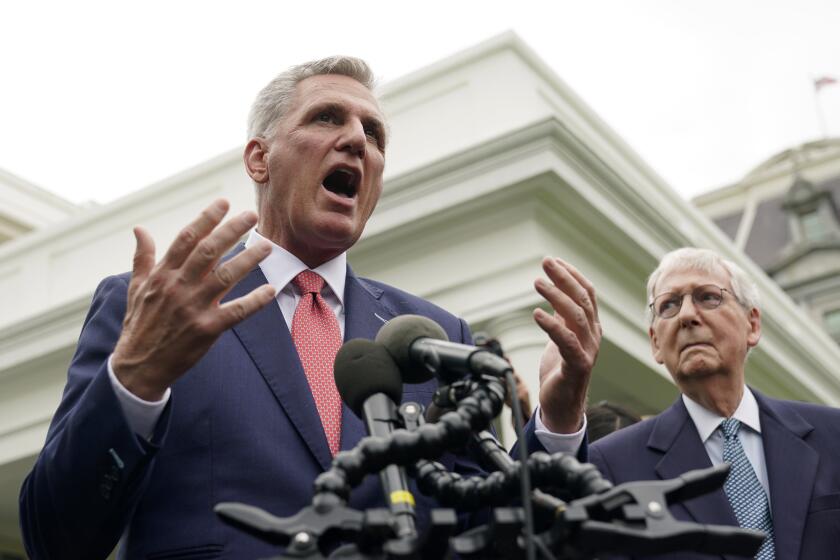Column: When Kevin McCarthy’s spending cuts get spelled out, even Republicans balk

- Share via
Whether you’re for the demand by House Republicans for deep spending cuts as a condition for raising the nation’s debt ceiling or you’re against it, there are some things you should know in assessing their gambit.
Perhaps the single most important fact is this: While Speaker Kevin McCarthy likes to claim that his debt limit bill would break Democrats’ “addiction to spending,” the Republicans — whose own appetite for spending is well established — would subject just 13% of federal spending to the knife.
They’ve said they’ll exempt national defense, some veterans programs, Social Security and Medicare, which amounts to about half of all spending. As for the portion they’re targeting, so-called domestic discretionary spending, that relatively small part of the overall budget covers just about everything else the government does, and that Americans expect it to do.
Opinion Columnist
Jackie Calmes
Jackie Calmes brings a critical eye to the national political scene. She has decades of experience covering the White House and Congress.
So the predictable has begun: The Republicans are having trouble making good on their boasts of easy-peasy spending cuts.
In short, they’re threatening the nation’s first default, and the chaos that would follow, by demanding spending cuts that many of them don’t truly want to become law.
We got evidence of the squeeze this week, even as McCarthy, in his on-again, off-again debt ceiling negotiations with President Biden, was full of budget-cutting bravado to reporters. Just before midnight on Monday — midnight! — the House Appropriations Committee canceled its Tuesday and Wednesday meetings when voting was scheduled on the first of the dozen bills that annually fund the federal government’s operations. Those bills have to fill in the gory details of the spending cuts that Republicans left unidentified when they passed McCarthy’s debt limit bill last month.
The handcuffs that House Republicans have put on Speaker McCarthy will make it almost impossible for him to sign off on a debt ceiling compromise.
The stated reason for the postponement: The committee’s Republican majority wanted to give McCarthy “maximum flexibility” in his talks with Biden.
The real reason: They didn’t have the votes to pass their own bills. Failure, in turn, would have undercut McCarthy’s leverage in the negotiations.
Rep. Rosa DeLauro of Connecticut, the senior Democrat on the committee, got her email canceling the meetings at 11:53 p.m. She called it “a sign of unraveling” among Republicans, given that the cuts they were finally specifying “are so staggering.”
McCarthy’s debt-limit bill calls for trimming 9% from the $1.6 trillion that currently goes to annual discretionary spending. But with Republicans’ promised exemptions for the Pentagon and some veterans programs, the cuts in what’s left on the table would reach something close to a devastating 30%. Accounting for inflation, the reductions would be even greater.
Contrary to conventional wisdom, the president should just keep paying the nation’s bills if Republicans refuse to raise the debt ceiling.
Even then, the savings generated would be small relative to the nation’s annual budget deficits. And Republicans, if they have their way, would in effect wipe out those savings by extending all the Trump-era tax cuts for another decade, adding trillions more to the federal debt they purport to fear.
So what’s included in the budget slice that Republicans want to carve up? The bills stalled in the Appropriations Committee by Republicans’ infighting would cover spending for agriculture, including farm subsidies and nutrition programs; border protections and homeland security; a new program to assist veterans exposed to toxins during wartime; and the construction and maintenance of military facilities and housing, to name some.
Also on the Republicans’ block in future appropriations bills: air traffic control; cancer and Alzheimer’s research; Meals on Wheels; infrastructure in general; opioid treatments; Head Start; rail, food and drug safety; and much, much more. Although Social Security and Medicare wouldn’t face cuts, good luck getting assistance once the programs’ staffing is reduced.
The debt ceiling is plainly unconstitutional and a nuclear weapon in the hands of willful children. It’s time to ignore it.
“Washington cannot continue to spend money we do not have at the expense of children and grandchildren,” McCarthy tweeted. Yet children, more than their grandparents drawing Social Security and Medicare, would be among the Americans most affected by the proposed cuts, and not just because of the reductions in education, nutrition, housing and healthcare programs that benefit many of them now.
At stake is the country they’ll inherit. Economists and fiscal experts consider much of the spending that is at issue as “seed corn” investments in physical and human capital, with a proven return.
How the debt limit talks end is anyone’s guess. I’m as concerned as the “scared” right-of-center experts I quoted months ago now that we’re nearing the June deadline when the Treasury says it will no longer be able to borrow to meet obligations incurred by past presidents and Congresses.
Kevin McCarthy and the House Republicans are willing to risk not just default over the debt ceiling, but the future of our hot, hot, hot planet
Republicans say they’ll make no concessions, that agreeing to raise the debt ceiling is concession enough. Really? Lifting the debt limit is their patriotic duty, especially considering their complicity in driving up the debt — fully a quarter of it during Donald Trump’s presidency.
“I believe there are a number of members on the other side of the aisle that understand the hypocrisy here,” DeLauro told me. “But they’re not going to say anything.”
And consider this: Republicans want to raise the debt limit only enough to allow the Treasury to borrow through next spring. What then? They’ll hold us up for more spending cuts.
That would be on top of the ones they’re already having trouble producing, while threatening the nation with economic disaster.
More to Read
Get the latest from Jackie Calmes
Commentary on politics and more from award-winning opinion columnist.
You may occasionally receive promotional content from the Los Angeles Times.
















